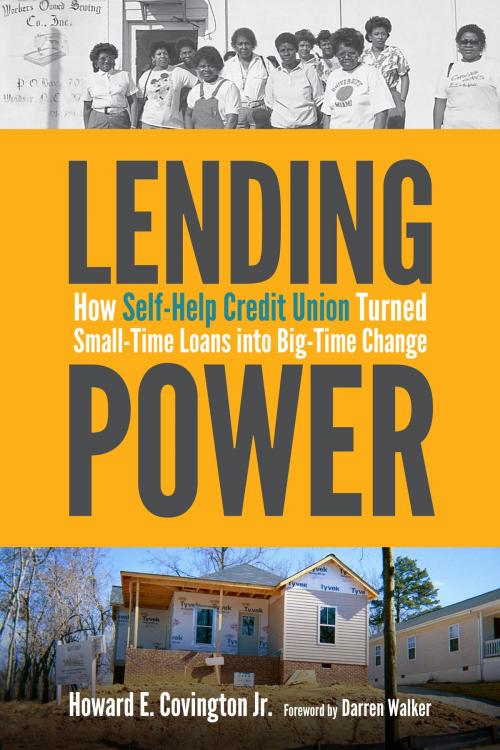Lending Power
How Self-Help Credit Union Turned Small-Time Loans into Big-Time Change
Business & Finance, Finance & Investing, Banks & Banking, Biography & Memoir, Political, Nonfiction, History, Americas, United States| Author: | Howard E. Covington Jr. | ISBN: | 9780822372776 |
| Publisher: | Duke University Press | Publication: | October 19, 2017 |
| Imprint: | Duke University Press Books | Language: | English |
| Author: | Howard E. Covington Jr. |
| ISBN: | 9780822372776 |
| Publisher: | Duke University Press |
| Publication: | October 19, 2017 |
| Imprint: | Duke University Press Books |
| Language: | English |
Established by Martin Eakes and Bonnie Wright in North Carolina in 1980, the nonprofit Center for Community Self-Help has grown from an innovative financial institution dedicated to civil rights into the nation's largest home lender to low- and moderate-income borrowers. Self-Help's first capital campaign—a bake sale that raised a meager seventy-seven dollars for a credit union—may not have done much to fulfill the organization's early goals of promoting worker-owned businesses, but it was a crucial first step toward wielding inclusive lending as a weapon for economic justice.
In Lending Power journalist and historian Howard E. Covington Jr. narrates the compelling story of Self-Help's founders and coworkers as they built a progressive and community-oriented financial institution. First established to assist workers displaced by closed furniture and textile mills, Self-Help created a credit union that expanded into providing home loans for those on the margins of the financial market, especially people of color and single mothers.
Using its own lending record, Self-Help convinced commercial banks to follow suit, extending its influence well beyond North Carolina. In 1999 its efforts led to the first state law against predatory lending. A decade later, as the Great Recession ravaged the nation's economy, its legislative victories helped influence the Dodd-Frank Wall Street Reform and Consumer Protection Act and the formation of the Consumer Financial Protection Bureau. Self-Help also created a federally chartered credit union to expand to California and later to Illinois and Florida, where it assisted ailing community-based credit unions and financial institutions.
Throughout its history, Self-Help has never wavered from its mission to use Dr. Martin Luther King Jr.'s vision of justice to extend economic opportunity to the nation's unbanked and underserved citizens. With nearly two billion dollars in assets, Self-Help also shows that such a model for nonprofits can be financially successful while serving the greater good. At a time when calls for economic justice are growing ever louder, Lending Power shows how hard-working and dedicated people can help improve their communities.
Established by Martin Eakes and Bonnie Wright in North Carolina in 1980, the nonprofit Center for Community Self-Help has grown from an innovative financial institution dedicated to civil rights into the nation's largest home lender to low- and moderate-income borrowers. Self-Help's first capital campaign—a bake sale that raised a meager seventy-seven dollars for a credit union—may not have done much to fulfill the organization's early goals of promoting worker-owned businesses, but it was a crucial first step toward wielding inclusive lending as a weapon for economic justice.
In Lending Power journalist and historian Howard E. Covington Jr. narrates the compelling story of Self-Help's founders and coworkers as they built a progressive and community-oriented financial institution. First established to assist workers displaced by closed furniture and textile mills, Self-Help created a credit union that expanded into providing home loans for those on the margins of the financial market, especially people of color and single mothers.
Using its own lending record, Self-Help convinced commercial banks to follow suit, extending its influence well beyond North Carolina. In 1999 its efforts led to the first state law against predatory lending. A decade later, as the Great Recession ravaged the nation's economy, its legislative victories helped influence the Dodd-Frank Wall Street Reform and Consumer Protection Act and the formation of the Consumer Financial Protection Bureau. Self-Help also created a federally chartered credit union to expand to California and later to Illinois and Florida, where it assisted ailing community-based credit unions and financial institutions.
Throughout its history, Self-Help has never wavered from its mission to use Dr. Martin Luther King Jr.'s vision of justice to extend economic opportunity to the nation's unbanked and underserved citizens. With nearly two billion dollars in assets, Self-Help also shows that such a model for nonprofits can be financially successful while serving the greater good. At a time when calls for economic justice are growing ever louder, Lending Power shows how hard-working and dedicated people can help improve their communities.















